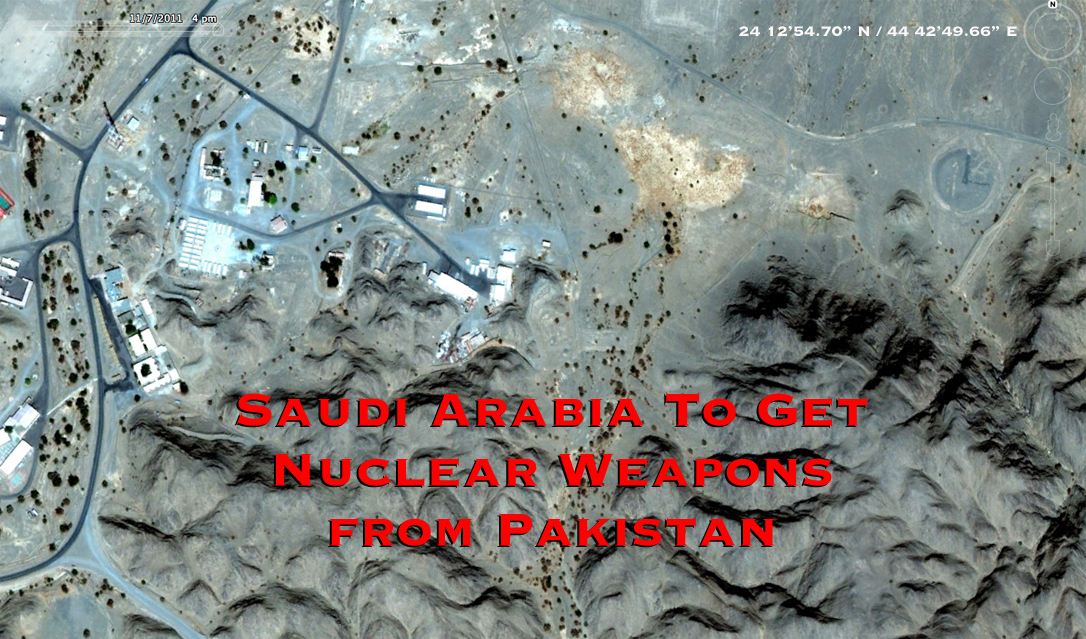

[Above: The Saudi Arabian ballistic missile site where nuclear warheads from Pakistan will sooon be positioned.]
The state of Israel, which has a healthy stockpile of its own nuclear weapons (over 200), is constantly instigating accusations that Iran's nuclear energy program is actually an effort to build nuclear weapons which they will use to destroy Israel.
The Israelis often mis-quote a speech given by ex-president Ahmadinejad in which he foresaw the demise of the current Zionist regime, claiming it proves Iran's intent to destroy Israel as a country. Even today, Israeli president Netanyahu clamors for everything from more sanctions to outright invasion and war with Iran because of their suspected nuclear intentions.
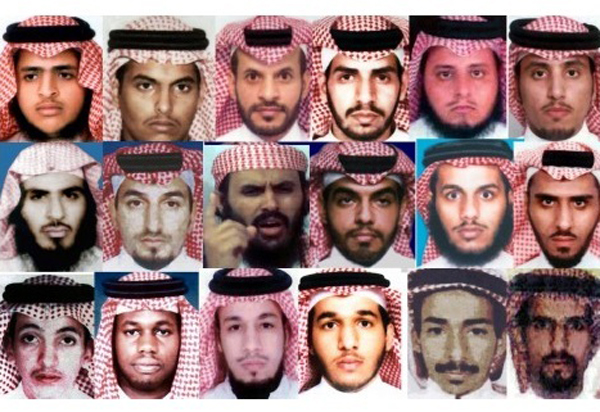
Yet an even greater danger faces both Israel and Iran. Their close neighbor, Saudi Arabia -- the same nation that brought us the 9-11 hijackers (they all had Saudi passports, ABOVE) and the on-going civil war in Syria (they pay rebels and arm them to fight against the current Syrian government) -- will soon have at least two nuclear warheads (possibly four) to threaten and possibly annihilate their foes.
In the spring of 2013, a senior Nato decision maker told a BBC reporter that he had seen intelligence that nuclear weapons made in Pakistan on behalf of Saudi Arabia are now sitting ready for delivery. Recent reports have suggested that these warheads have already been delivered and are awaiting delivery systems.
According to the report, in October of 2013, Amos Yadlin, a former head of Israeli military intelligence, told a conference in Sweden that if Iran got the bomb, "the Saudis will not wait one month. They already paid for the bomb, they will go to Pakistan and bring what they need to bring."
This reinforces a comment made by King Abdullah of Saudi Arabia back in 2009 when he warned visiting US special envoy to the Middle East, Dennis Ross, that if Iran crossed the nuclear bomb threshold, "we will get nuclear weapons". The kingdom of Saudi Arabia has since sent the Americans numerous signals of its nuclear intentions.
Gary Samore, President Barack Obama's counter-proliferation adviser, has told the BBC reporter in an interview:
"I do think that the Saudis believe that they have some understanding with Pakistan that, in extremis, they would have claim to acquire nuclear weapons from Pakistan."
History of the Saudi Weapons
In the late 1980s, Saudi Arabia secretly bought dozens of CSS-2 ballistic missiles from China. These rockets have inertial guidance only, meaning you point them and fire them and have little control over their trajectory. They are considered by many experts too inaccurate for use as conventional weapons but not for the delivery of a nuclear bomb. These were state-of-the-art and widely deployed 20 years ago.
This summer experts at defence publishers IHS Jane's reported the completion of a new Saudi CSS-2 base with missile launch rails aligned with Israel and Iran. The thought is that these ballistic missiles will soon be fitted with nuclear warheads.
For many years, Saudi Arabia has given generous financial assistance to Pakistan's defence sector, including its missile and nuclear labs. Visits by the then Saudi defence minister Prince Sultan bin Abdulaziz al Saud to the Pakistani nuclear research centre in 1999 and 2002 underlined the closeness of the defence relationship.
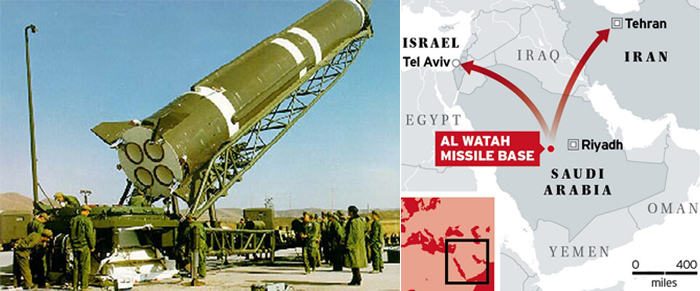
[Left: the Chinese CSS-2 ballistic missile of the type currently stationed at a base just 200 km SW of Riyadh in Saudi Arabia. Right: A map of the region showing the targets of the CSS-2 ballistic missile pads based on the designs and azimuth angles.]
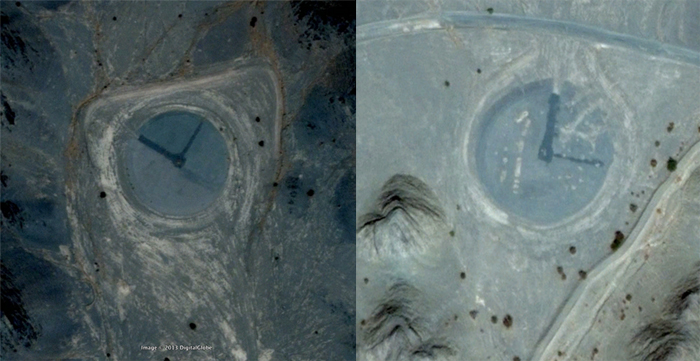
[A close inspection on google-earth reveals the azimuth of each ballistic missile launch pad. Left: is aimed towards Tel Aviv (Israel). Right: is aimed to Tehran (Iran).]
Because of tensions between India and Pakistan, the latter co-operated closely with China which sold them missiles and provided the design for a nuclear warhead. Pakistan quickly implemented these designs, using funds provided by Saudi Arabia.
As a side note, Pakistani scientist Abdul Qadeer Khan was accused by western intelligence agencies of selling atomic know-how and uranium enrichment centrifuges to Libya and North Korea, thus proliferating the spread of nuclear weapons.
AQ Khan is also believed to have passed the Chinese nuclear weapon design to those countries, including the blueprint for a nuclear warhead specifically to fit on the CSS-2 missile, i.e the same type sold to Saudi Arabia. Allegations of a Saudi-Pakistani nuclear deal started to circulate in the 1990s, but were denied by Saudi officials.
Saudi Arabia denies nuclear ambitions
Saudi diplomats remind the West that their country has signed the Non-Proliferation Treaty, and that they have often called for a nuclear-free Middle East. They remind the West of Israel's confirmed possession of such weapons and the fact that Israel has refuded to sign on to the Non-Proliferation Treaty.
But the game has recently changed. Saudi Prince Bandar has recently stated that his country (Saudi Arabia) will begin pursuing a direction away from American cooperation, stating the reasons as the US failed military intervention in overthrowing the Assad regime in Syria.
Saudi Arabia and Israel both had financial stakes in seeing the Assad regime overthrown because both wanted to place a natural gas pipeline through Syria to take advantage of their huge reserves and the lucrative European market, especially in Eastern European countries.
"The Saudis speak about Iran and nuclear matters very seriously. They don't bluff on this issue."
--Simon Henderson Director of Global Gulf and Energy Policy Program, Washington Institute
In Eating the Grass, Henderson's semi-official history of the Pakistani nuclear program, Major General Feroz Hassan Khan wrote that Prince Sultan's visits to Pakistan's atomic labs were not proof of an agreement between the two countries. But he acknowledged, "Saudi Arabia provided generous financial support to Pakistan that enabled the nuclear program to continue."
A paper leaked in 2003 by senior Saudi officials mapped out three possible responses to what they perceived as their future role in the Middle East:
- To acquire their own nuclear weapons
- To enter into an arrangement with another nuclear power to protect the kingdom (similar to NATO)
- To rely on the establishment of a nuclear-free zone in the Middle East.
It was around the same time, 2003, that the US invaded Iraq and serious strains in the US-Saudi relationship began to show.
The Saudis resented the removal of Saddam Hussein because, as bad as he was, he maintained a stable country and was a strong critic of US policy on Israel. They also were disappointed in the failure of the US to intervene in Iran's rise to power in the region -- something that was strengthened by the weakening of Iraq, their long time enemy.
In 2007, the US mission in Riyadh noted they were being asked questions by Pakistani diplomats about US knowledge of "Saudi-Pakistani nuclear cooperation" and the suspicions of an "agreement" were growing. It was becoming obvious that, of the three options cited, Saudi Arabia had chosen to obtain their own nuclear weapons.
By 2009 Saudi princes and officials were giving explicit warnings of their intention to acquire nuclear weapons if Iran did. Last year Saudi officials in Riyadh told a journalist from the Times:
"It would be completely unacceptable to have Iran with a nuclear capability and not the kingdom".
The (Unspoken) Deal
According to the BBC report, a senior Pakistani confirmed the broad nature of the deal -- probably unwritten -- his country had reached with the kingdom and asked rhetorically:
"What did we think the Saudis were giving us all that money for? It wasn't charity."
Another ex-intelligence officer from Pakistan said:
"The Pakistanis certainly maintain a certain number of warheads on the basis that if the Saudis were to ask for them at any given time they would immediately be transferred."
Israeli intelligence says delivery is imminent
According to Israeli information Saudi Arabia is now ready to take delivery of finished warheads for its long-range missiles.
The warheads are likely to be delivered to the ballistic missile base and fitted to the existing CSS-2 Dongfeng 3 missiles which have a range of about 4,000 km. Although these missiles have long since been retired in most modern national defense systems, they remain quite adequate to pose a lethal deterrent to Saudi Arabia's foes, namely Iran.
Strange Bed-fellows: Saudi Arabia and Israel
With the huge Leviathan Gas Reserve that was discovered off the shore of Lebanon and taken over by the Israelis, as well as more recent discoveries of oil in the Golan Heights, Israel has a common interest with Saudi Arabia and her neighbors (Qatar) in seeing the Assad regime overthrown. Assad has a strong relationship with Russia who currently controls the natural gas market to Europe, through a pipeline in Turkey. Assad has refused to allow the Israelis and Saudi Arabia (acting on behalf of their neighbor Qatar) to use the country to pipe their natural gas to the same market.
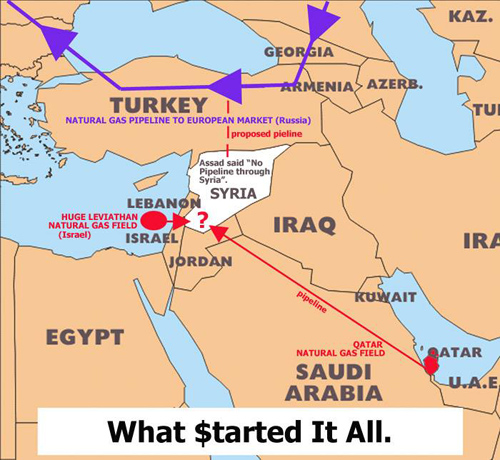
Billions of dollars are at stake. The natural gas in Qatar is burnt at the oil pumps because there is no available market. The Israelis have yet to tap their newly acquired reserve and have few options but to send it through Syria to the European markets.
The targeting of the ballistic missile launch pads is an old design. The Saudis try to play down the fact that Israel is in the cross-hairs of one of their missile pads and perhaps there are plans to reposition the launch facility towards Iran in the near future. Then again, maybe not.
All of this is, of course, denied officially by all of the countries involved.
The Saudi embassy in London has also issued a statement pointing out that the Kingdom is a signatory to the Non-Proliferation Treaty and has worked for a nuclear free Middle East. But this is just rhetoric.
But the Saudi statement also points out that the UN's "failure to make the Middle East a nuclear free zone (because of Israel's disclosed nuclear weapons) is one of the reasons the Kingdom of Saudi Arabia rejected the offer of a seat on the UN Security Council".
The statement further states that the Saudi Foreign Minister has stressed that this lack of international action "has put the region under the threat of a time bomb that cannot easily be defused by maneuvering around it".
BBC source
Other sources and Other sources.

Dongfeng 3 (CSS-2)
From Wikipedia, the free encyclopedia
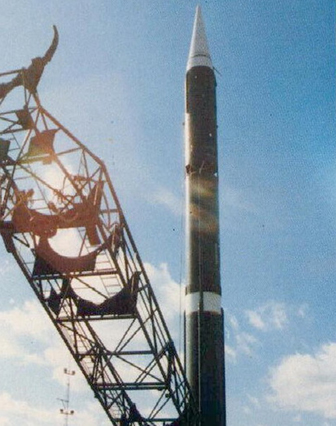
The DF-3 is often considered China's first "domestic" intermediate-range ballistic missile (IRBM). The common ICBM design was greatly influenced by soviet R-14 Chusovaya missile and the first stage engine itself was a direct copy of the La-350 booster engine developed by Isayev OKB-2.
The responsibility for the development guidance has been attributed to both Tu Shou'e and Sun Jiadong, and the missile as produced at Factory 211 (Capital Astronautics Co., also known as Capital Machine Shop.
The 2,500 km DF-3 was originally designed with 2,000 kg payload to carry an atomic (later thermonuclear) payload. A further improved DF-3A with 3,000 km range (about 4,000 km with reduced payload) was developed in 1981, and exported to Saudi Arabia with conventional high-explosive warhead.
Most DF-3/DF-3A's have been retired, with 30-40 remaining and scheduled to be replaced by DF-21. Their range of 2,810 km means they fall just short of being able to target Guam, although the 2012 DOD report on China's military power states that they have a range of 3,300 km, which would be enough to target Guam. The 2013 Pentagon report on China's military power confirms the DF-3's 3,300 km range, and its maps show Guam being within the DF-3's range.
Saudi will shift away from US: Prince Bandar
Saudi Arabia's intelligence chief has said the kingdom will make a "major shift" in dealings with the United States in protest at its perceived inaction over the Syria war and its overtures to Iran, a source close to Saudi policy said on Tuesday.
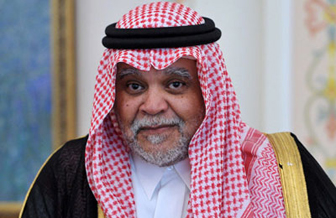
Prince Bandar bin Sultan [Above] told European diplomats that Washington had failed to act effectively on the Syria crisis and the Israeli-Palestinian conflict, was growing closer to Tehran, and had failed to back Saudi support for Bahrain in its action on anti-government protests in 2011, the source said.
It was not immediately clear if Prince Bandar's reported statements had the full backing of King Abdullah.
"The shift away from the US is a major one," the source close to Saudi policy said. "Saudi doesn't want to find itself any longer in a situation where it is dependent.
"Prince Bandar told diplomats that he plans to limit interaction with the US," he said. "This happens after the US failed to take any effective action on Syria and Palestine.
"Relations with the US have been deteriorating for a while, as Saudi feels that the US is growing closer with Iran."
The source declined to provide more details of Bandar's talks with the diplomats, which took place in the past few days.
But he suggested that the planned change in ties between the energy superpower and its traditional US ally would have wide-ranging consequences, including on arms purchases and oil sales.
The United States and Saudi Arabia have been allies since the kingdom was declared in 1932, giving Riyadh a powerful military protector and Washington secure oil supplies.
The prince's initiative follows a surprise Saudi decision on Friday to reject a coveted two-year term on the UN Security Council in protest at "double standards" at the United Nations.
Prince Bandar, who was Saudi ambassador to Washington for 22 years, is seen as a foreign policy hawk, especially on Iran. The Sunni Muslim kingdom's rivalry with Shi'ite Iran, an ally of Syria, has amplified sectarian tensions across the Middle East.
A son of the late defence minister and crown prince, Prince Sultan, and a protégé of the late King Fahd, he fell from favour with King Abdullah after clashing on foreign policy in 2005.
But he was called in from the cold last year with a mandate to bring down President Bashar Al-Assad, diplomats in the Gulf say. Over the past year he has led Saudi efforts to bring arms and other aid to Syrian rebels while his cousin, Foreign Minister Prince Saud Al-Faisal, worked the diplomatic corridors.
[source]
US breaks with Israel over Palestine
By David Harris-Gershon (@David_EHG)
Much has been written in the past week on Israel's fiery condemnation of nuclear talks in Geneva between Iran and several world powers, including the United States. Notably, Israeli Prime Minister Binyamin Netanyahu's vociferous opposition to talks championed by John Kerry.
Many have focused upon the moment when Netanyahu claimed that Iran was getting "the deal of the century" from America, to which Kerry publicly and testily countered that "the time to oppose [a deal with Iran] is when you see what it is, not to oppose the effort to find out what is possible."
However, while this rift over Iran between Israel and the Obama administration caught headlines, a significant, and possibly historic, break between Israel and the U.S. over Middle East peace was occurring as well. On Thursday, in a rare joint interview on both Israeli and Palestinian television, Kerry made clear in ways this administration has never done just how frustrated Washington is with Israel's settlement expansion and overall investment in peace:
"How, if you say you're working for peace and you want peace, and a Palestine that is a whole Palestine that belongs to the people who live there, how can you say we're planning to build in a place that will eventually be Palestine? So it sends a message that perhaps you're not really serious."
In the interview's wake, Larry Derfner at +972 Magazine wrote:
"I don't know of a precedent for a U.S. secretary of state, or a president, publicly attacking Israel's policies toward the Palestinians like Kerry did -- and in front of not only the Israeli public, but the Palestinian public as well.
And when Netanyahu responded to Kerry's words by saying, "Israel won't give in to such intimidation tactics," Derfner continued:
"This is not the way Americans and Israelis ordinarily talk to each other in public. This is not a tiff. This is not one of the natural ups and downs in the unshakable relationship bla bla bla. This is a break between the U.S. and Israel on the peace process, caused by the secretary of state's decision to finally speak Washington's mind out loud.
Now, Derfner may be overstating the significance of Kerry's words. For after all, they are just words, not actions. However, with the United States announcing that it would be offering a peace proposal in January, and with Kerry boldly exposing Washington's views before both the Israeli and Palestinian public, perhaps there is reason to suspect that things are turning. Perhaps the U.S. is finally breaking from Israel on the peace process, on its continued settlement expansions, on its commitment to peace.
Today, it was reported that Israel issued plans for the largest settlement expansion in a decade -- 20,000 units. Immediately, the State Department demanded, publicly, that Israel explain its decision. Even more, the U.S. said that it "does not recognize the legitimacy of settlements."
[Update: after U.S. and Palestinian pressure, Netanyahu has cancelled the 20,000 settlement plans.]
There is a shift occurring in Washington, and President Obama is allowing Kerry to let that shift be known to the world. Whether or not, come January, this shift will translate into increased pressure from Washington remains to be seen. However, what is happening is rare. And for a status quo which needs to end, rare words from Washington are exactly what's needed. Even more so, actions to follow them.